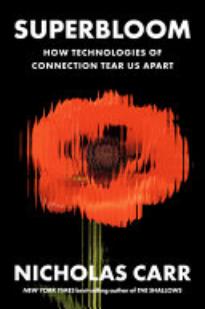2018 School Spending Survey Report
Superbloom: How Technologies of Connection Tear Us Apart
COPY ISBN
VERDICT Insightful, but not as revolutionary as The Shallows, as Carr is now one voice among many warning about social media.
RELATED
ALREADY A SUBSCRIBER? LOG IN
We are currently offering this content for free. Sign up now to activate your personal profile, where you can save articles for future viewing




Comment Policy:
Comment should not be empty !!!